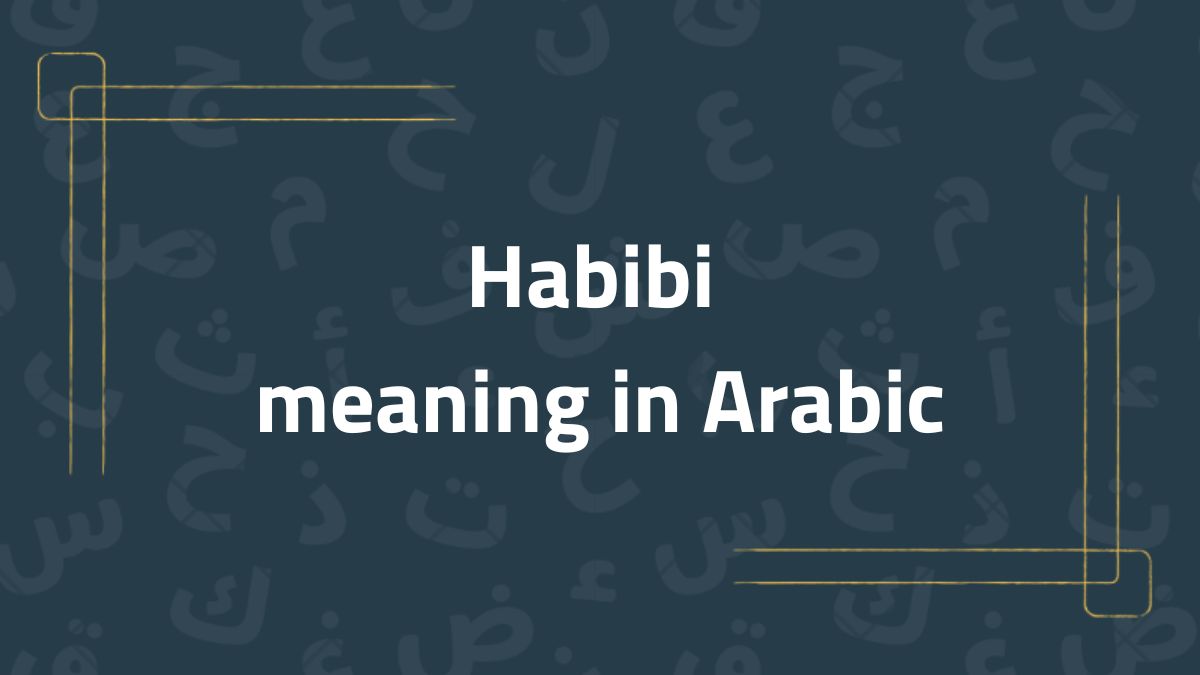The Word Habibi Meaning in Arabic With Examples

The Arabic word “habibi” is widely recognized and used in daily conversations. It carries deep emotional meaning and reflects affection. This article explains the meaning of “habibi” in Arabic, its linguistic roots, cultural significance, and usage in sentences.
The Meaning of “Habibi” in Arabic
“Habibi” (حبيبي) translates to “my love” or “my dear” in English. It is a term of endearment used between friends, family members, and romantic partners. The feminine form is “habibti” (حبيبتي). The word expresses warmth, care, and closeness.
Pronunciation:
-
Habibi (ha-bee-bee) – masculine
-
Habibti (ha-beeb-tee) – feminine
Linguistic Root and Grammatical Usage
The word “habibi” comes from the Arabic root ح-ب-ب (H-B-B), which relates to love and affection. The root forms words like:
-
Hubb (حب) – love (noun)
-
Yuhibbu (يحب) – to love (verb)
“Habibi” is the possessive form, meaning “my beloved.” It changes based on gender and number:
-
Habibi – for a male (my beloved)
-
Habibti – for a female (my beloved)
-
Habibayya – for two people (my two beloveds)
-
Habibina – for a group (our beloved)
Examples of “Habibi” in Arabic Sentences
-
كيف حالك يا حبيبي؟
Kayfa haluka ya habibi?
(How are you, my dear?) -
شكرًا لك، حبيبتي.
Shukran lak, habibti.
(Thank you, my love.) -
تعال هنا، حبيبي.
Ta’al huna, habibi.
(Come here, my love.)
Cultural or Quranic Significance of “Habibi”
The word “habibi” is not directly mentioned in the Quran, but its root (حب) appears in verses about love and devotion. For example:
-
وَٱلَّذِينَ ءَامَنُوٓا۟ أَشَدُّ حُبًّا لِّلَّهِ
“And those who believe are stronger in love for Allah.” (Quran 2:165)
In Arab culture, “habibi” is commonly used to show friendship, respect, and affection. It is a key term in Arabic music, poetry, and daily interactions.
Common Misunderstandings or Mistakes
-
Some learners confuse “habibi” with “habib” (حبيب), which means “beloved” but lacks the possessive “my.”
-
Non-native speakers may overuse “habibi” in formal settings. It is mostly casual and friendly.
Why You Should Learn “Habibi”
Understanding “habibi” helps in daily Arabic conversations. It is a warm and friendly term used widely in Arab-speaking countries. Learning such words improves communication and cultural connection.
Conclusion
The word “habibi” is a beautiful Arabic term meaning “my love” or “my dear.” It comes from the root H-B-B, linked to love and affection. Used in both casual and emotional contexts, “habibi” strengthens relationships. Learning this word enhances Arabic language skills and cultural understanding.
Discover the Quran and Arabic with Shaykhi Academy
We highly recommend Shaykhi Academy for anyone seeking to learn the Quran and Arabic with excellence. The academy is known for combining expert teaching with a compassionate approach, making it a top choice for students worldwide who want to connect deeply with the words of Allah.
At Shaykhi Academy, you’ll find highly qualified teachers who specialize in guiding learners of all ages and levels. Whether you’re just beginning your journey with Arabic letters or aiming to master Tajweed and Quran recitation, their personalized lessons ensure steady progress at your own pace.
With engaging classes, flexible scheduling, and a focus on both spiritual and linguistic growth, Shaykhi Academy makes learning both enjoyable and impactful.
Watch a sample class below to see Shaykhi Academy in action:
Learn Arabic, Quran, And Tajweed With Free Trial!
Make your home a place of faith, understanding, and connection with the Quran. Whether you're starting from scratch or deepening your knowledge, Shaykhi Academy is here to guide you — step by step. ✅ Tailored for all ages ✅ Clear, structured learning ✅ Flexible online sessions ✅ Book your free trial session now!
Learn More
